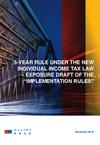November 2018 - 5-year rule under the new individual income tax law – exposure draft of the“implementation rules”
The exposure draft of the “Implementation Rules of the new Individual Income Tax Law” (the “Draft Implementation Rules”) was issued on 20 October for public consultation. The deadline for public consultation was set at 4 November of this year.
The Draft Implementation Rules address certain concerns raised by the public. In particular, the concern raised in relation to the 5-year break as accorded to expatriates under the old Implementation Rules was addressed. It is discussed in this issue of Tax Commentary.
Under the old Implementation Rules, individuals without domicile in China will not be subject to IIT on their worldwide income until after they have resided in China for five consecutive full years. The definition of “residing in China for a year” was determined by how many days the individual is outside China in a particular year of stay. If the individual is absent from China for a single period of more than 30 days or multiple absences totaling for more than 90 days in a year, he would be considered as “not residing in China for a year”. Consequently, if an expatriate could monitor his absence from China in any year of a 5-year period, he would not be subject to IIT on the worldwide income, but only subject to IIT with respect to his China-sourced income.
Under the new IIT Law, an individual would be considered as a resident in China in a particular tax year if he has spent 183 days or more in China during the relevant tax year, and would be subject to IIT on his worldwide income. It therefore raised the concern that the old “5-year rule” was discontinued.


